模块一unit1schoollife
牛津英语模块一unit1schoollife教案
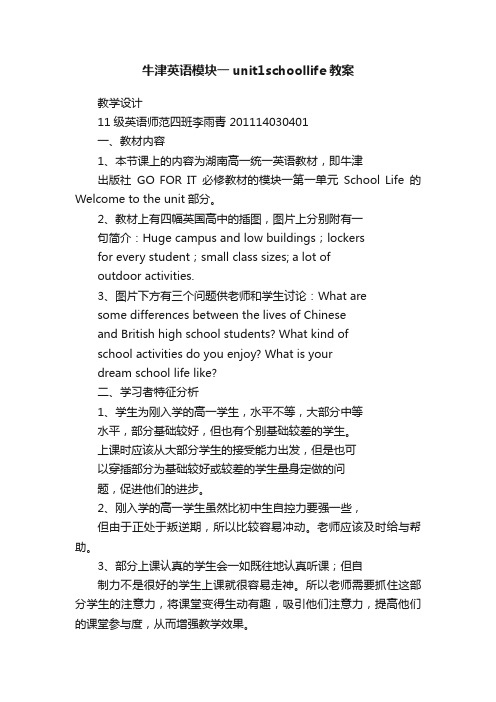
牛津英语模块一unit1schoollife教案教学设计11级英语师范四班李雨青 201114030401一、教材内容1、本节课上的内容为湖南高一统一英语教材,即牛津出版社GO FOR IT必修教材的模块一第一单元School Life的Welcome to the unit部分。
2、教材上有四幅英国高中的插图,图片上分别附有一句简介:Huge campus and low buildings;lockersfor every student;small class sizes; a lot ofoutdoor activities.3、图片下方有三个问题供老师和学生讨论:What aresome differences between the lives of Chineseand British high school students? What kind ofschool activities do you enjoy? What is yourdream school life like?二、学习者特征分析1、学生为刚入学的高一学生,水平不等,大部分中等水平,部分基础较好,但也有个别基础较差的学生。
上课时应该从大部分学生的接受能力出发,但是也可以穿插部分为基础较好或较差的学生量身定做的问题,促进他们的进步。
2、刚入学的高一学生虽然比初中生自控力要强一些,但由于正处于叛逆期,所以比较容易冲动。
老师应该及时给与帮助。
3、部分上课认真的学生会一如既往地认真听课;但自制力不是很好的学生上课就很容易走神。
所以老师需要抓住这部分学生的注意力,将课堂变得生动有趣,吸引他们注意力,提高他们的课堂参与度,从而增强教学效果。
三、教学(学习)目标1、使学生掌握基本的关于学校设备的单词。
2、使学生从初中过渡到高中,认识到初中和高中的区别。
3、使学生认识到中国高中和英国高中的区别。
4、使学生能用英语大致地表达出自己的想法。
Module1 Unit1 School Life
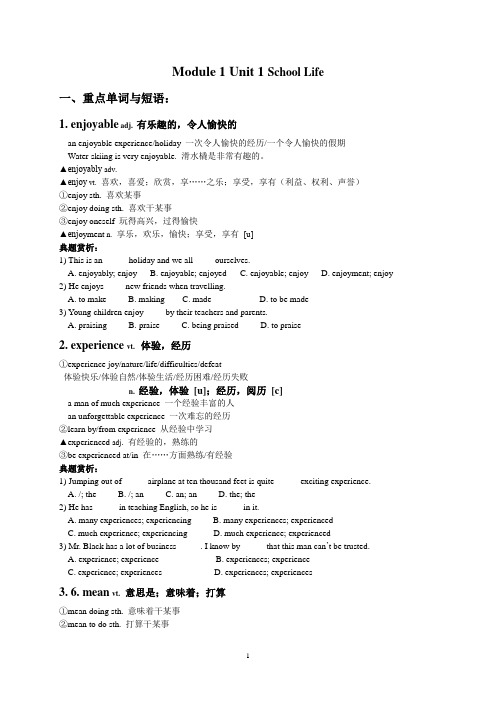
Module 1 Unit 1 School Life一、重点单词与短语:1. enjoyable adj. 有乐趣的,令人愉快的an enjoyable experience/holiday 一次令人愉快的经历/一个令人愉快的假期Water-skiing is very enjoyable. 滑水橇是非常有趣的。
▲enjoyably adv.▲enjoy vt.喜欢,喜爱;欣赏,享……之乐;享受,享有(利益、权利、声誉)①enjoy sth. 喜欢某事②enjoy doing sth. 喜欢干某事③enjoy oneself 玩得高兴,过得愉快▲enj oyment n.享乐,欢乐,愉快;享受,享有[u]典题赏析:1) This is an _____ holiday and we all ____ ourselves.A. enjoyably; enjoyB. enjoyable; enjoyedC. enjoyable; enjoyD. enjoyment; enjoy2) He enjoys ____ new friends when travelling.A. to makeB. makingC. madeD. to be made3) Young children enjoy ____ by their teachers and parents.A. praisingB. praiseC. being praisedD. to praise2. experience vt.体验,经历①experience joy/nature/life/difficulties/defeat体验快乐/体验自然/体验生活/经历困难/经历失败n.经验,体验[u];经历,阅历[c]a man of much experience 一个经验丰富的人an unforgettable experience 一次难忘的经历②learn by/from experience 从经验中学习▲experienced adj. 有经验的,熟练的③be experienced at/in 在……方面熟练/有经验典题赏析:1) Jumping out of _____ airplane at ten thousand feet is quite _____ exciting experience.A. /; theB. /; anC. an; anD. the; the2) He has _____ in teaching English, so he is _____ in it.A. many experiences; experiencingB. many experiences; experiencedC. much experience; experiencingD. much experience; experienced3) Mr. Black has a lot of business _____. I know by _____ that this man can’t be trusted.A. experience; experienceB. experiences; experienceC. experience; experiencesD. experiences; experiences3. 6. mean vt.意思是;意味着;打算①mean doing sth. 意味着干某事②mean to do sth. 打算干某事③mean sb. to do sth. 打算让某人干某事④be meant for打算用来……⑤be meant to do sth. 旨在干某事,目的在干某事⑥mean that…意味着……⑦What do you mean by...? 你……是什么意思?adj.卑鄙的,吝啬的;差的,不好的;中间的,中等的;平均的⑧be mean with sth. 对某物吝啬/不好⑨be mean to sb. 对某人卑鄙/不好▲meaning n.意思,意义[c/u]▲meaningful adj.有重要意义的,有涵义的▲meaningless adj.无意义的典题赏析:1) Missing the last bus means _____ home.A. to walkB. walkingC. walkedD. walk2) —I’m sorry, but I didn’t mean _____ out your secret.—But you know, letting out one’s secret means _____ one’s feelings.A. to let; to hurtB. letting; hurtingC. to let; hurtingD. letting; to hurt3) —Why haven’t you bought any butter?—I _____ to but I forgot about it.A. likedB. wishedC. meantD. expected4) —I’d like to go to the cinema with you, Mum.—Sorry, my dear, but the film is _____ adults only.A. admittedB. permittedC. meant forD. intended to4. attend vt.“出席,参加”(指参加会议,典礼,婚礼,葬礼,仪式等。
牛津高中英语模块一unit—教案schoollife

牛津高中英语模块一u n i t—教案s c h o o l l i f e Revised by BLUE on the afternoon of December 12,2020.课堂教学安排作后置定语)看下面的图片。
Standingontopofthehill,wefoundthecitybelowverybeautiful.站在山顶上,我们发现下面的城市非常美丽。
Writedowneightkeywordsthatyouexpecttofindinthereadingpassagebelow.写下在下文中你预计会出现的8个关键词。
Note:常见作后置定语的副词有home,here,there,back,above,downstairs,upstairs等。
Hewasknockeddownbyacaronhiswayhome.他在回家的路上被车撞了。
Theairhereisveryfresh.这里的空气很新鲜。
Thebookshereareallforyou.这里的书都是给你的。
Thepeoplethereareveryfriendly.那里的人非常友好。
Thechildwaslostintheforestandcouldn’tfindthewayback.那个孩子在树林里迷路了,找不到回家的路。
Whendoyouthinktheinventionsinthepicturesaboveweremade你认为上面图片里的物体是什么时候发明的Themandownstairsgothomeverylatethatnight.楼下的那个人晚上回来的很晚。
,learningandhardwork.中学是一个探索、学习和刻苦努力的时期。
inancienttimes在古代inmoderntimes在现代inShakespeare’stime在莎士比亚时代atthesametime同时duringthewartime在战时阶段atnotime=bynomeans决不onceuponatime很久以前Howtimeflies!(谚)光阴似箭;日月如梭。
高一英语Module 1 Unit 1 School life 教学案
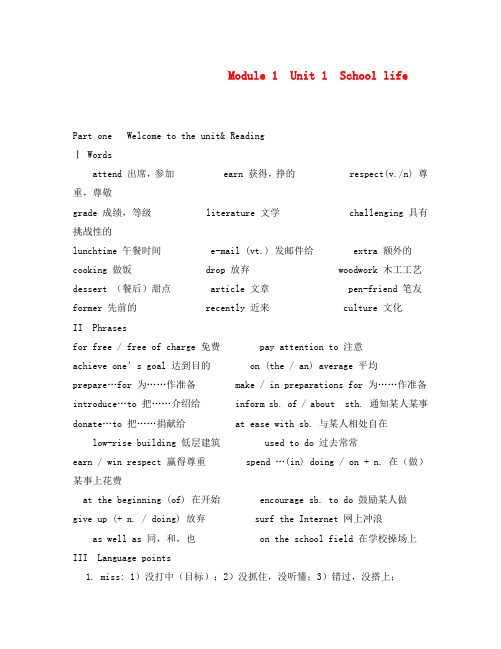
Module 1 Unit 1 School lifePart one Welcome to the unit& ReadingⅠ Wordsattend 出席,参加 earn 获得,挣的 respect(v./n) 尊重,尊敬grade 成绩,等级 literature 文学 challenging 具有挑战性的lunchtime 午餐时间 e-mail (vt.) 发邮件给 extra 额外的cooking 做饭 drop 放弃 woodwork 木工工艺dessert (餐后)甜点 article 文章 pen-friend 笔友former 先前的 recently 近来 culture 文化II Phrasesfor free / free of charge 免费 pay attention to 注意achieve one’s goal 达到目的 on (the / an) average 平均prepare…for 为……作准备 make / in preparations for 为……作准备introduce…to 把……介绍给 inform sb. of / about sth. 通知某人某事donate…to 把……捐献给 at ease with sb. 与某人相处自在low-rise building 低层建筑 used to do 过去常常earn / win respect 赢得尊重 spend …(in) doing / on + n. 在(做)某事上花费at the beginning (of) 在开始 encourage sb. to do 鼓励某人做give up (+ n. / doing) 放弃 surf the Internet 网上冲浪as well as 同,和,也 on the school field 在学校操场上III Language points1.miss: 1)没打中(目标);2)没抓住,没听懂;3)错过,没搭上;4)丢失;5)想念用法:+ n. / doing在括号内写出miss的意义:a, The falling rock just ________ my head. ( )b, He tried to catch the ball, but ________ it. ( )c, I ________ what you said because of the noise outside. ( )d, She ________ her lessons and had to make up them later. ( ) e, I don’t want to miss ________ (see) the singer on TV tonight. ( ) f, You said you lost your wallet; when did you ________ it? ( ) g, They had been searching for the ________ boy for 3 days. ( ) h, I know how much you ________ your mother. ( )i, She misses ________ (have) her breakfast in bed. ( )2.field: 1) 田地;领域 (常与in连用)2)场地,(球)场;战场(常与on连用)a, The children camped ______ the open field.b, He was killed ______ the field of battle.c, ______ the field of science, art, literature they have made outstanding contributions.d, ______ the football field, the judge’s word is final.3.experience: 1) vt. 经历,感受2) n. 经历(过的事)[C];经验[U]experienced: adj. 有经验的填入适当形式,并在括号内写出其词性:a, It was the first time that he had __________ the sense of beauty.( )b, Our country has __________ great changes in the last thirty years.( )c, They are quite __________ in teaching beginners. ( )d, She doesn’t have any __________ in dealing with children. ( ) f, His later __________ confirmed(证实) its correctness. ( )4.immediately: 1) adv. 立刻,马上,紧接着2) conj. 一……就 (= as soon as / when)请选择:a, I left ______ the clock struck twelve.b, Andrew’s eyes lit up(亮起来)_______ they entered the room.A. beforeB. immediately whenC. soonD. immediately5.Going to a British high school for one year was a very enjoyable andexciting experience for me. (p.2, lines 1-2)句子的主语、宾语(动词或介词宾语)常为名词。
中职英语基础模块1 school life
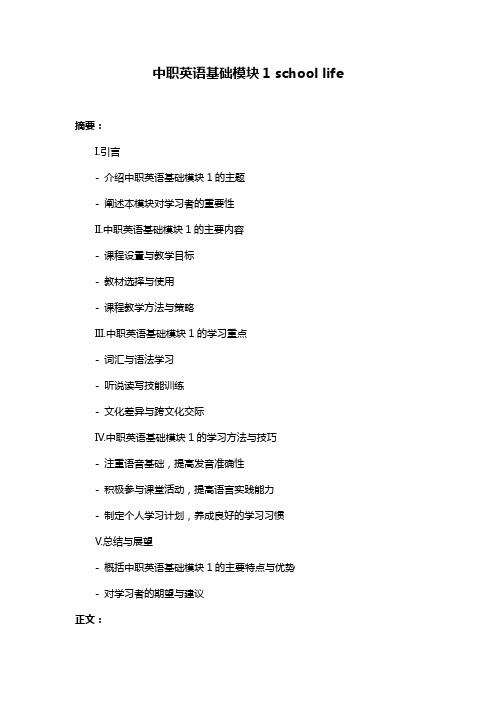
中职英语基础模块1 school life摘要:I.引言- 介绍中职英语基础模块1的主题- 阐述本模块对学习者的重要性II.中职英语基础模块1的主要内容- 课程设置与教学目标- 教材选择与使用- 课程教学方法与策略III.中职英语基础模块1的学习重点- 词汇与语法学习- 听说读写技能训练- 文化差异与跨文化交际IV.中职英语基础模块1的学习方法与技巧- 注重语音基础,提高发音准确性- 积极参与课堂活动,提高语言实践能力- 制定个人学习计划,养成良好的学习习惯V.总结与展望- 概括中职英语基础模块1的主要特点与优势- 对学习者的期望与建议正文:中职英语基础模块1是专为中职学生设计的一门英语课程,旨在帮助学生打好英语基础,提高其英语听说读写能力,为今后的学习和工作做好准备。
本模块的学习内容主要包括学校生活,让学生在熟悉的环境中掌握英语基本技能。
一、中职英语基础模块1的主要内容中职英语基础模块1的课程设置紧密围绕教学目标,旨在全面提高学生的英语能力。
教材选择注重实用性和针对性,使学生在有限的课堂时间内,快速掌握实用的英语知识。
课程教学方法与策略丰富多样,包括讲授、讨论、角色扮演、互动游戏等,旨在激发学生的学习兴趣,提高学习效果。
二、中职英语基础模块1的学习重点中职英语基础模块1的学习重点包括词汇与语法学习、听说读写技能训练以及文化差异与跨文化交际。
词汇与语法学习是英语学习的基础,学生需要通过大量的例句和实际应用,掌握常用词汇和语法规则。
听说读写技能训练则帮助学生在不同场景下,灵活运用英语进行沟通。
此外,本模块还注重文化差异与跨文化交际,使学生了解英语国家的文化背景,提高跨文化交际能力。
三、中职英语基础模块1的学习方法与技巧要学好中职英语基础模块1,学生需注重语音基础,提高发音准确性。
在课堂活动中,学生应积极参与,提高语言实践能力。
此外,学生还需制定个人学习计划,养成良好的学习习惯,如每天坚持阅读、背诵单词和句子等。
译林版英语模块一 Unit 1 School life
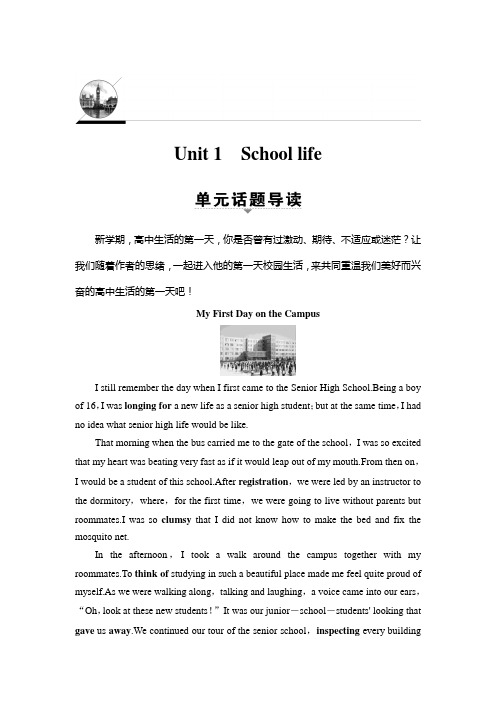
Unit 1School life新学期,高中生活的第一天,你是否曾有过激动、期待、不适应或迷茫?让我们随着作者的思绪,一起进入他的第一天校园生活,来共同重温我们美好而兴奋的高中生活的第一天吧!My First Day on the CampusI still remember the day when I first came to the Senior High School.Being a boy of 16,I was longing for a new life as a senior high student;but at the same time,I had no idea what senior high life would be like.That morning when the bus carried me to the gate of the school,I was so excited that my heart was beating very fast as if it would leap out of my mouth.From then on,I would be a student of this school.After registration,we were led by an instructor to the dormitory,where,for the first time,we were going to live without parents but roommates.I was so clumsy that I did not know how to make the bed and fix the mosquito net.In the afternoon,I took a walk around the campus together with my roommates.To think of studying in such a beautiful place made me feel quite proud of myself.As we were walking along,talking and laughing,a voice came into our ears,“Oh,look at these new students!”It was our junior-school-students' looking that gave us away.We continued our tour of the senior school,inspecting every buildingand every garden until the sun began to set.In the evening,we sat together,talking about the past and the future.We were so excited that no one wanted to go to bed.1.long for 渴望,希望2.registration n.登记;注册;挂号3.clumsy adj.笨拙的4.give away 泄露,出卖;赠送5.inspect v.检查,检验;审视;检阅;视察1.What did the auther feel the first day he/she came to the senior High School?2.What did the auther do in the afternoon?【答案】 1.He/She was so excited that his/her heart was beating very fast as if it would leap out of his/her mouth. 2.He/She took a walk around the campus together with his/her roommates.Section ⅠWelcome to the unit & Reading—Preparing根据提示写出下列单词1.enjoyable adj.有乐趣的;令人愉快的2.headmaster n.校长3.earn vt.获得;赚,挣得4.respect n.& vt.尊敬,敬重5.devote vt.致力于;献身6.literature n.文学7.average adj.一般的,普通的;平均的8.struggle n.难事;斗争;努力vi.奋斗,努力;挣扎9.challenging adj.具有挑战性的10.encouragement n.鼓励11.extra adj.额外的,外加的12.sculpture n.雕像,雕塑13.dessert n.甜点14.satisfaction n.满意15.experience n.& vt.经历,体验16.exchange n.& vt.交换;交流17.academic adj.学业的,学术的看单词学构词后缀-able常用在动词后面,构成形容词。
Module 1《Unit1 School life》word教学设计教案,DOC

I.单元教学目标The First Period ReadingThe Second Period Function and writingThe Third Period Listening and speakingThe Forth Period Language studyThe Fifth Period Integrating skillsThe Sixth Period WritingUnit 1 School life I. 单元教学目标II. 目标语言Ⅲ. 教材分析与教材重组1. 教材分析本单元以School life为话题,旨在通过单元教学使学生了解英国校园生活的一些基本情况及中英两国校园生活的不同之处;学习并能运用表示校园设施的一些基本词汇;学习定语从句的基本概念及关系代词的用法;能就校园活动的话题展开讨论;能就校园活动情况向班任老师做出报告;学习通知的写法;学会设计以介绍学校俱乐部为主题的海报等。
Welcome to the unit 部分利用四幅图片,分别从(校园风貌、生活设施、课堂教学、师生关系)四个不同的侧面介绍了英国校园生活的有关情况。
该部分还设计了三个讨论话题,引导学生对中英两国校园生活进行比较,并就相关话题发表自己的看法。
Reading部分的短文节选自一份校园杂志。
文章由一位交换留学生所写。
作者通过自己的亲身经历简要地介绍了英国学校生活的一些情况。
文章前后分别设计了五个部分的练习:前两个练习(A、B)要求学生运用本单元介绍的两种基本阅读方法(skimming and scanning)阅读文章,把握文章主旨大意,了解文中明显的细节内容;练习C1通过问题的形式考查学生对文中具体信息的把握程度;C2通过判断正误练习加深学生对阅读材料的理解;D部分为词汇练习,要求学生首先联系上下文猜测所给词汇的含义;然后通过配对练习帮助学生掌握新词的含义和用法;E部分要求学生通过运用所给词汇填空的方式完成一封英国学生写给Wei Hua的信件,以进一步加深学生对阅读内容的理解;练习F设计了两个话题,引导学生对校园生活有关话题展开讨论,以获得对文章深层次的理解。
(完整word)高中英语模块一Unit1Schoollife基础语法精讲牛津译林版1
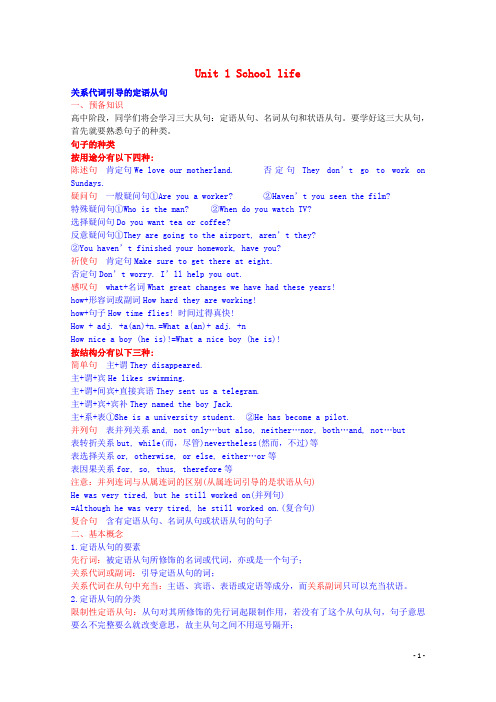
Unit 1 School life关系代词引导的定语从句一、预备知识高中阶段,同学们将会学习三大从句:定语从句、名词从句和状语从句。
要学好这三大从句,首先就要熟悉句子的种类。
句子的种类按用途分有以下四种:陈述句肯定句We love our motherland. 否定句They don’t go to work on Sundays.疑问句一般疑问句①Are you a worker?②Haven’t you seen the film?特殊疑问句①Who is the m an? ②When do you watch TV?选择疑问句Do you want tea or coffee?反意疑问句①They are going to the airport,aren’t they?②You haven’t finished your homework, have you?祈使句肯定句Make sure to get there at eight.否定句Don’t worry.I’ll help you out.感叹句what+名词What great changes we have had these years!how+形容词或副词How hard they are working!how+句子How time flies! 时间过得真快!How + adj. +a(an)+n.=What a(an)+ adj. +nHow nice a boy (he is)!=What a nice boy (he is)!按结构分有以下三种:简单句主+谓They disappeared.主+谓+宾He likes swimming.主+谓+间宾+直接宾语They sent us a telegram.主+谓+宾+宾补They named the boy Jack.主+系+表①She is a university student.②He has become a pilot.并列句表并列关系and, not only…but also, neither…nor, both…and, not…but表转折关系but, while(而,尽管)nevertheless(然而,不过)等表选择关系or, otherwise, or else, either…or等表因果关系for, so, thus, therefore等注意:并列连词与从属连词的区别(从属连词引导的是状语从句)He was very tired, but he still worked on(并列句)=Although he was very tired, he still worked on.(复合句)复合句含有定语从句、名词从句或状语从句的句子二、基本概念1.定语从句的要素先行词:被定语从句所修饰的名词或代词,亦或是一个句子;关系代词或副词:引导定语从句的词;关系代词在从句中充当:主语、宾语、表语或定语等成分,而关系副词只可以充当状语。
模块一UnitSchoollife
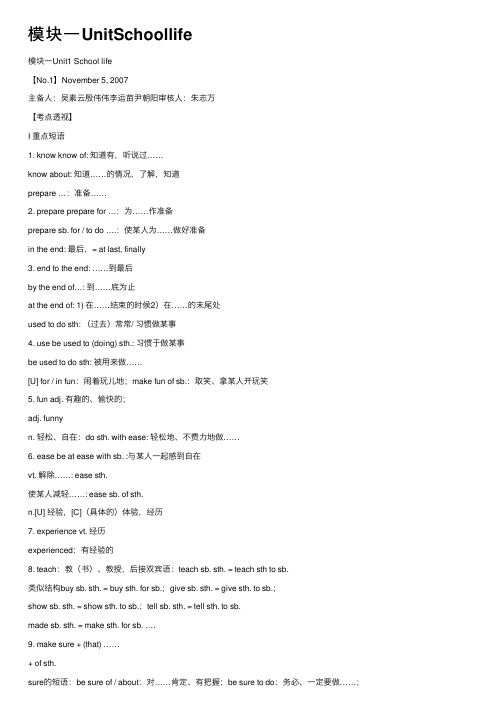
模块⼀UnitSchoollife模块⼀Unit1 School life【No.1】November 5, 2007主备⼈:吴素云殷伟伟李运苗尹朝阳审核⼈:朱志万【考点透视】I 重点短语1. know know of: 知道有,听说过……know about: 知道……的情况,了解,知道prepare …:准备……2. prepare prepare for …:为……作准备prepare sb. for / to do ….:使某⼈为……做好准备in the end: 最后,= at last, finally3. end to the end: ……到最后by the end of…: 到……底为⽌at the end of: 1) 在……结束的时候2)在……的末尾处used to do sth: (过去)常常/ 习惯做某事4. use be used to (doing) sth.: 习惯于做某事be used to do sth: 被⽤来做……[U] for / in fun:闹着玩⼉地;make fun of sb.:取笑、拿某⼈开玩笑5. fun adj. 有趣的、愉快的;adj. funnyn. 轻松、⾃在:do sth. with ease: 轻松地、不费⼒地做……6. ease be at ease with sb. :与某⼈⼀起感到⾃在vt. 解除……: ease sth.使某⼈减轻……: ease sb. of sth.n.[U] 经验,[C](具体的)体验,经历7. experience vt. 经历experienced:有经验的8. teach:教(书)、教授,后接双宾语:teach sb. sth. = teach sth to sb.类似结构buy sb. sth. = buy sth. for sb.;give sb. sth. = give sth. to sb.;show sb. sth. = show sth. to sb.;tell sb. sth. = tell sth. to sb.made sb. sth. = make sth. for sb. ….9. make sure + (that) ……for sure:必定、⼀定,= surely⽤于句⾸,作“虽然”解,引导让步状语从句,不与but / however连⽤,10. though 但可与yet / still / and yet连⽤, = although⽤于句末,作“但是”解,起转折作⽤n. (⼀)滴、点,降落、下跌:a drop of water, drops of rain11. drop vt. 掉/降下、戒掉(坏习惯)、跳过(学科、⾳)drop by:顺便到(某处)以下;drop的词组drop in at:顺便拜访(某地),后接地名;drop in on:顺便拜访(某⼈),后接⼈;drop out (of):脱落、掉脱、退出……n. (可数)少量的、⼩块的,常⽤a bit of…或bits of…。
译林牛津模块一第一单元课件School life
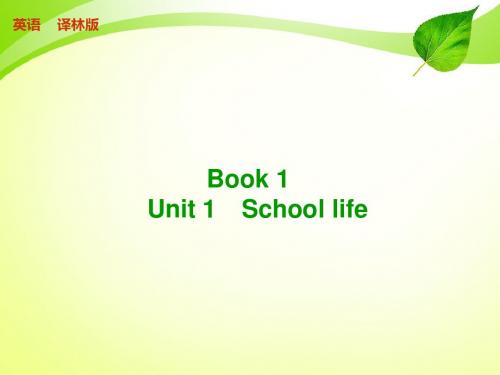
respectable teacher and we are all respectful (respect) to him. 2.Organizers are making final preparations
1.He is a (prepare) for next week’s festival. 3.He spoke English so fluently (fluent) that we all took him for a native speaker. 4.The final team selection (select) will be made tomorrow.
enjoy
v t. 喜欢;欣赏
13. experience / Ik spIər Iəns/ n . [C ] 经历;[U ]经验;v t. 经历,体验→ experienced adj. 有经验的 14. respect / rI spekt / n . & v t. 尊敬,敬重→
respectful adj. 表示敬意的,尊敬的→ respectable adj. 值得尊敬的;体面的
7. somehow /sʌm haʊ/ adv . 不知为什么;不知怎么
任;收费;控告,起诉;给……充电 10.broadcast /brɔː dkɑː st / v t. & n . 广播,播放
基础知识排查
重点单词突破
重点短语突破
句法与语法突破
高频考点
基础知识排查
11. event 项目 12.enjoyable / In dʒɔIəbl /adj. 有乐趣的;令人愉快的 → / I vent / n .(重要)事件;社交活动;比赛
英语
模块1Unit1Schoolli...
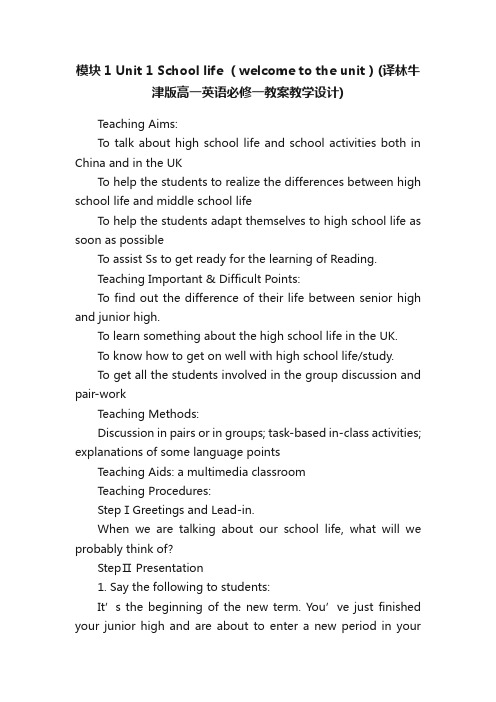
模块1 Unit 1 School life (welcome to the unit)(译林牛津版高一英语必修一教案教学设计)Teaching Aims:To talk about high school life and school activities both in China and in the UKTo help the students to realize the differences between high school life and middle school lifeTo help the students adapt themselves to high school life as soon as possibleTo assist Ss to get ready for the learning of Reading.Teaching Important & Difficult Points:To find out the difference of their life between senior high and junior high.To learn something about the high school life in the UK.To know how to get on well with high school life/study.To get all the students involved in the group discussion and pair-workTeaching Methods:Discussion in pairs or in groups; task-based in-class activities; explanations of some language pointsTeaching Aids: a multimedia classroomTeaching Procedures:StepⅠGreetings and Lead-in.When we are talking about our school life, what will we probably think of?StepⅡ Presentation1. Say the following to students:It’s the beginning of the new term. You’ve just finished your junior high and are about to enter a new period in yourstudies. I am happy to give your lessons and I hope we can be friends.I can see that some of your are eager to know what studying at senior high will be like. Will it be different from junior high? Well, there are certainly many differences between junior high and senior high, but there are also some things that are the same in every school in China.What about schools in other countries? Do you have different experiences? Are schools all over the world the same? This is the subject of our first unit.2. Ask students to read the instruction and tell them:Here are three pictures that show some aspects of school life in the UK. Please read the instructions, look at the pictures: what's the difference between schools in China and the UK?Step Ⅲ Discussion1. Divide the students into four groups and discuss the four pict ures on P1. Let’s describe what they can see in each picture in groups of four. After three minutes, I’ll ask one of each group to report what you talk about.Possible answers:Picture oneWe can see s wide playground and some low-rise buildings in the picture. From it we can see that the campus is a huge one, and it is larger than the normal high schools in cities of China. But the buildings there are lower than those of China we have a large population, so the local government cannot afford to provide as large an area as that in the UK for each high school.] From the points of view, larger schools are better for the school activities of our students than the crowded ones.Picture twoWe can see a lot of lockers in the picture as we often notice in the movies about school life in the west. We like the idea that we can have a locker of our own. We can keep our secret or things in it, such as the posters of my favourite stars, our diary and our letters as well.Picture threeIn this picture, we find a huge and bright classroom in which there are only twenty students or so. Their desks are not in good order, which is not allowed in our school. They are even not facing the teacher when they sit there. It is very different from the classroom in our school.Picture fourThere are two students and a teacher in the picture. The teacher is carrying a snake in his hand while the students are making notes of maybe what the teacher is saying. Perhaps they are studying the snake. They seem to be enjoying their staying toge ther. So we think the phrase “at ease with our teacher” means our teacher and we get along well with each other. We are not only teachers and students, but also we are friends. We like the idea that we can make friends with our teachers. Anny, do you want to be our friend?2. We have studied the four pictures about schools in the UK. Now discuss with your group members about the following question: What’s the difference in schools between China and the UK? Then draw some conclusions to complete the following form.Aspects Schools in the UK Schools in Chinacampus and buildings Students can see huge campus and low-rise buildings.It is the biggest difference from schools in China. School inChina usually have a large enough campus to make sure students have enough space to study and play in.But most school buildings are taller, at least three storeys.facilities There are rows of lockers by the classrooms for students to put their stationary, books, exercise books and other belongings. Students bring what they need for lessons to school and then take it all back home after school. Most schools in China do not have the equipment in the classroom.size of every class There are fewer students in a class, no more than 30 per class. There are usually more students in high school, perhaps 40 to 50 per class. Recently some schools are beginning to limit the number of students in each class.relationship between teacher and students Students have a close relationship with their teachers. They feel at ease and comfortable with them. It is similar in China. Nowadays, lots of teachers and students have established a good relationship with each other. They respect each other and work to gain a better understanding of each other.some other aspects you know Students in the UK can choose whatever subjects they like or drop ones they are not interested in; they are graded A, B, C, D for every subject they choose rather than 100 points. In China, students have to learn the subjects required for all the high school students. They are not free to drop subjects even though they hate learning at all. They are scored according to the fixed points, such as 100, 120 and 150.3. Ask students to discuss the three questions in pairs, and them ask some of them to report their answers to the questions to the whole class.What is your dream school life like?What kind of school activities do you enjoy?What do you think of your life here in the new school?Step Ⅳ Language point1. at ease with our teacherease 1) vt. & vi. (eased, easing)减轻(痛苦、负担)我给他些药使他减轻疼痛. I gave him some medicine to ease the pain.2) n. 轻松, 自在at (one’s) ease 轻松, 自在, 随便,不拘束他在这个陌生的房间里感到很紧张..He didn’t feel at his ease in the strange room.Her boyfriend was not at ease seeing her parents.with ease 容易地, 轻松地 = easily他们有望在这次比赛中轻松获胜.They are expected to win the game with ease.take one’s ease 休息,轻松一下Step Ⅳ SummaryToday we have known about the differences between the life of Chinese and British high school students. I hope we’ll get on very well and all of you will enjoy yourselves during the high school, and you are on the way to becoming a college student.StepⅤHomework.Find more about any other differences between the high school lives in the UK and in China, either by surf the Internet or by reading some articles in newspapers or magazines.Make a plan of your studies in the coming years and make a list of goals that you want to achieve in the coming three years.Preview Reading by going through all the relative words and expressions in the wordlist.。
牛津高中英语模块一语言点
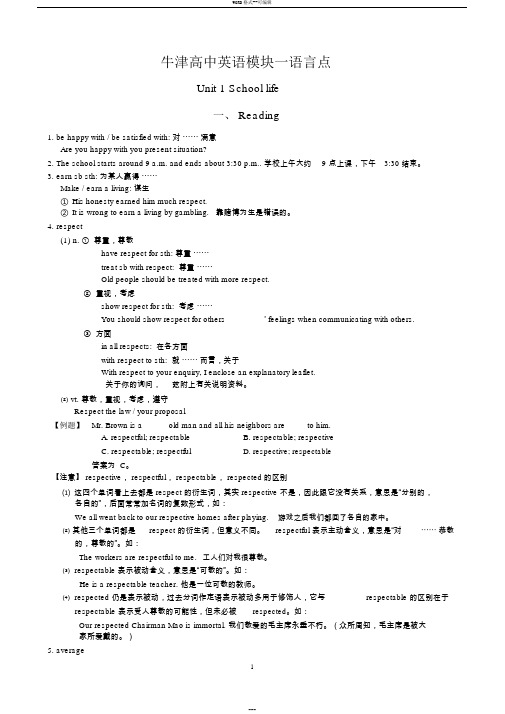
牛津高中英语模块一语言点Unit 1 School life一、 Reading1.be happy with / be satisfied with: 对⋯⋯满意Are you happy with you present situation?2. The school starts around 9 a.m. and ends about 3:30 p.m.. 学校上午大约9 点上课,下午3:30 结束。
3.earn sb sth: 为某人赢得⋯⋯Make / earn a living: 谋生①His honesty earned him much respect.②It is wrong to earn a living by gambling. 靠赌博为生是错误的。
4.respect(1)n. ①尊重,尊敬have respect for sth: 尊重⋯⋯treat sb with respect: 尊重⋯⋯Old people should be treated with more respect.② 重视,考虑show respect for sth: 考虑⋯⋯You should show respect for others’ feelings when communicating with others.③ 方面in all respects: 在各方面with respect to sth: 就⋯⋯而言,关于With respect to your enquiry, I enclose an explanatory leaflet.关于你的询问,兹附上有关说明资料。
⑵ vt. 尊敬,重视,考虑,遵守Respect the law / your proposal【例题】Mr. Brown is a _____ old man and all his neighbors are ____ to him.A. respectful; respectableB. respectable; respectiveC. respectable; respectfulD. respective; respectable答案为 C。
模块一unit1schoollife

模块一unit 1 school life (Welcome + Reading部分的知识点)1 time 表示“时间”不可数;表示“一段时期,时代,倍数或次数”是可数名词e.g. High school is a time of discovery , learning and hard work.2 偌大的校园huge campus3 户外活动outdoor activity4 理想的校园生活dream school life5 你认为…怎么样?What do you think of sb / sth?6 Going to a British high school for one year was a very enjoyable experience for me.去一所英国高中学习一年对我来讲是一个非常愉快的经历。
注意:这里动名词做主语, 一个动名词做主语,谓语用单数。
e.g. Having a walk after meals is good for health.7. experience vt. 经历;体验e.g. We have experienced happiness and sadness together in a same school.experience n. 经历(可数);经验(不可数)e.g. The sailor has rich experience and he often tells us his interesting experiences.这水手有丰富的经验,他常常给我们讲他有趣的经历。
This is a real experience not a dream.这是一次真实的经历并不是做梦。
experienced adj. 经验丰富的(be experienced in doing / sth 在…方面有经验)8 be happy with sb/sth= be satisfied with sb/sth 对…感到满意Be happy with the life you create. 满意你自己所创造的生活。
中职英语基础模块1 school life

中职英语基础模块1 school life【原创实用版】目录1.中职英语基础模块 1 的重要性2.School Life 单元的内容概述3.具体课程内容与学习目标4.如何有效学习中职英语基础模块 1正文中职英语基础模块 1 是中等职业学校英语课程的基础部分,对于学生掌握基本的英语知识、技能和应用能力有着至关重要的作用。
在这个模块中,学生将学习到各种日常交际用语和基本的英语语法知识,为他们今后的学习和工作奠定坚实的基础。
School Life 单元是中职英语基础模块 1 的一个重要部分,该单元主要围绕学校生活展开,包括问候、介绍、校园生活、时间、食品等方面。
通过这个单元的学习,学生可以掌握如何用英语进行简单的日常交流,了解不同国家的学校生活和文化,培养他们的跨文化交际能力。
具体到课程内容,School Life 单元包括以下几个部分:问候和介绍、校园生活、时间、食品。
在学习问候和介绍部分,学生将学习如何用英语和他人进行问候和自我介绍,以及如何表达对他人的欢迎和祝愿。
在校园生活部分,学生将学习如何用英语描述学校的各种设施和活动,以及如何表达自己在校园生活中的感受和经历。
在时间部分,学生将学习如何用英语表达时间和日期,以及如何用英语询问和安排自己的时间。
在食品部分,学生将学习如何用英语描述各种食物和饮料,以及如何表达自己对食品的喜好和需求。
要有效学习中职英语基础模块 1,首先,学生要认真听讲、积极参与课堂活动,掌握教师教授的各项知识和技能。
其次,学生要在课后进行大量的练习,通过做题、写作、朗读等方式巩固所学知识。
最后,学生要通过实际应用,与他人用英语进行交流,提高自己的英语实际应用能力。
总的来说,中职英语基础模块 1 的学习对于学生的英语学习生涯至关重要,而 School Life 单元的学习则是这个模块的重要组成部分。
涛浙学校高中英语 模块一 Unit 1 School life单元知识单高中全册英语试题
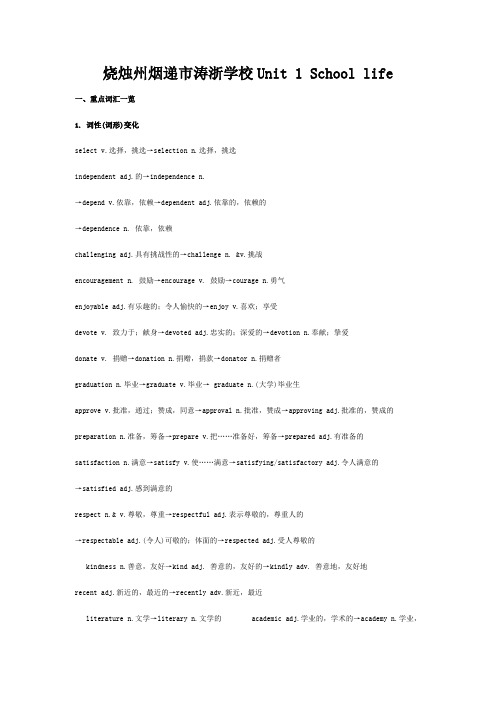
烧烛州烟递市涛浙学校Unit 1 School life一、重点词汇一览1. 词性(词形)变化select v.选择,挑选→selection n.选择,挑选independent adj.的→independence n.→depend v.依靠,依赖→dependent adj.依靠的,依赖的→dependence n. 依靠,依赖challenging adj.具有挑战性的→challenge n. &v.挑战encouragement n. 鼓励→encourage v. 鼓励→courage n.勇气enjoyable adj.有乐趣的;令人愉快的→enjoy v.喜欢;享受devote v. 致力于;献身→devoted adj.忠实的;深爱的→devotion n.奉献;挚爱donate v. 捐赠→donation n.捐赠,捐款→donator n.捐赠者graduation n.毕业→graduate v.毕业→ graduate n.(大学)毕业生approve v.批准,通过;赞成,同意→approval n.批准,赞成→approving adj.批准的,赞成的preparation n.准备,筹备→prepare v.把……准备好,筹备→prepared adj.有准备的satisfaction n.满意→satisfy v.使……满意→satisfying/satisfactory adj.令人满意的→satisfied adj.感到满意的respect n.& v.尊敬,尊重→respectful adj.表示尊敬的,尊重人的→respectable adj.(令人)可敬的;体面的→respected adj.受人尊敬的kindness n.善意,友好→kind adj. 善意的,友好的→kindly adv. 善意地,友好地recent adj.新近的,最近的→recently adv.新近,最近literature n.文学→literary n.文学的 academic adj.学业的,学术的→academ y n.学业,学术fluent adj.流利的,流畅的→fluently adv.流利地,流畅地2.重要单词experience n. & v. 经历,体验struggle v.奋斗,努力;挣扎 n.难事;斗争;努力earn v.获得;赚,挣得inform v.通知,告知exchange n. & v.交换;交流broadcast v.广播,播放run v.管理;操作professor n. 教授cooking n.做饭;烹饪,烹调extra adj.额外的,外加的former adj.以前的painting n.绘画,绘画作品splendid adj.极佳的,非常好的title n.(书的)名称;(文章的)题目,篇名dynasty n.朝代,王朝somehow adv.不知为什么;不知怎么地headmaster n.校长host n.主持人;主人,东道主schoolmate n.同学,校友event n.(重要)事件;社交活动;比赛项目composition n.作品,成分,作文outing n.短途旅行,远足poet n.诗人generation n.一代,一代人courtyard n.庭院,院子3.重要词组first of all首先devote… to …把……奉献给……earn respect赢得尊敬sound like听起来象be fond of 喜爱,喜欢at the end of 在……的末端used to (do sth.)过去常常(做某事) for free免费look back on回顾introduce…to…向……介绍surf the internet上网make a speech发表演讲donate…to …把……捐赠给……make good use of充分利用inform sb. of sth通知某人某事approve of 赞同,同意on average平均in charge of 负责such as如,像……这样的for one thing, for another thing一方面,另一方面opening hours开放时间4.教材原句Welcome to the unit & reading(Ps1-5)1.【教材原句】1.Going to a British high school for one year was a very enjoyable and exciting experience for me. (P2)在英国上了一年的中学对我来说是一段非常令人愉快和兴奋的经历。
牛津高中英语 模块一 第一单元 welcome M1U1 School life welcome to the unit
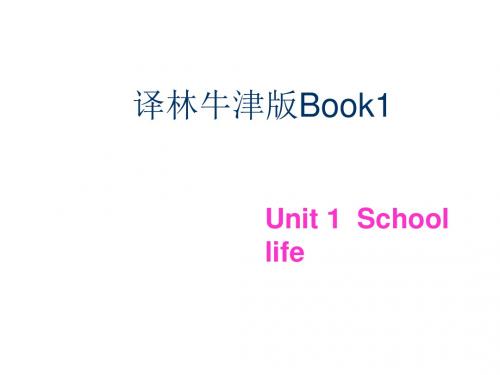
Unit 1 School life
Different schools
1. pre-school education (2----5years old)
(China) kindergarten (UK) play school / nursery school
2. primary education (5/6----12/13)
lecture performance evening party tug-of-war
sports meet military training class party woodwork
3. What is your dream school life like? Teachers? Classmates?
every student
equipment.
in the United Kingdom
Fewer students in each class
At ease with our teachers
in China
50-60-70
Be friendly to each other
1. What kind of school activities do you enjoy?
2. Do you know of any differences between the lives of Chinese and British high school students?
School life What kind of school activities do you enjoy?
sorrows joys
dreams discoveries
牛津英语_模块1_Unit1_School_Life_课件综述

cross-country skiing.
话题美文欣赏 课前自主学习 课堂互动探究
Jobs Many high school students have part-time jobs by the age of 15 or
B.She used to get up at 8 a.m.in China.
C.She was such a good cook that she liked cooking British food. D.She didn't like History or Art,so she chose Woodwork.
话题美文欣赏
课前自主学习
课堂互动探究
Ⅰ.单词识记 1.______________ 2.______________ 3.______________ 4.______________ 5.______________ 6.______________ adj.有乐趣的;令人愉快的 n.& vt.经历,体验 vt.获得;赚,挣得 n.文学 adj.一般的,普通的,平均的 adj.具有挑战性的
Unit 1
School life
话题美文欣赏
课前自主学习
课堂互动探究
High School In America, after middle school comes high school, which includes grades 9 through 12.①Students are required to take certain subjects like English, social studies, math, science, and physical education. In addition, they choose among elective subjects to complete their high school education. Electives include subjects in technology, music, art, and foreign languages.
高一英语Module 1 Unit 1 School life 教学案

Module 1 Unit 1 School lifePart one Welcome to the unit& ReadingⅠ Wordsattend 出席,参加 earn 获得,挣的 respect(v./n) 尊重,尊敬grade 成绩,等级 literature 文学 challenging 具有挑战性的 lunchtime 午餐时间 e-mail (vt.) 发邮件给 extra 额外的cooking 做饭 drop 放弃 woodwork 木工工艺dessert (餐后)甜点 article 文章 pen-friend 笔友former 先前的 recently 近来 culture 文化II Phrasesfor free / free of charge 免费 pay attention to 注意achieve one’s goal 达到目的 on (the / an) average 平均prepare…for 为……作准备 make / in preparations for 为……作准备introduce…to 把……介绍给 inform sb. of / about sth. 通知某人某事donate…to 把……捐献给 at ease with sb. 与某人相处自在low-rise building 低层建筑 used to do 过去常常earn / win respect 赢得尊重 spend …(in) doing / on + n. 在(做)某事上花费at the beginning (of) 在开始 encourage sb. to do 鼓励某人做give up (+ n. / doing) 放弃 surf the Internet 网上冲浪as well as 同,和,也 on the school field 在学校操场上III Language points1.miss: 1)没打中(目标);2)没抓住,没听懂;3)错过,没搭上;4)丢失;5)想念用法:+ n. / doing在括号内写出miss的意义:a, The falling rock just ________ my head. ( ) b, He tried to catch the ball, but ________ it. ( )c, I ________ what you said because of the noise outside. ( )d, She ________ her lessons and had to make up them later. ( )e, I don’t want to miss ________ (see) the singer on TV tonight. ( )f, You said you lost your wallet; when did you ________ it? ( )g, They had been searching for the ________ boy for 3 days. ( )h, I know how much you ________ your mother. ( )i, She misses ________ (have) her breakfast in bed. ( )2.field: 1) 田地;领域 (常与in连用)2)场地,(球)场;战场(常与on连用)a, The children camped ______ the open field.b, He was killed ______ the field of battle.c, ______ the field of science, art, literature they have made outstanding contributions.d, ______ the football field, the judge’s word is final.3.experience: 1) vt. 经历,感受2) n. 经历(过的事)[C];经验[U]experienced: adj. 有经验的填入适当形式,并在括号内写出其词性:a, It was the first time that he had __________ the sense of beauty. ( )b, Our country has __________ great changes in the last thirty years. ( )c, They are quite __________ in teaching beginners. ( )d, She doesn’t have any __________ in dealing with children. ( )f, His later __________ confirmed(证实) its correctness. ( )4.immediately: 1) adv. 立刻,马上,紧接着2) conj. 一……就 (= as soon as / when)请选择:a, I left ______ the clock struck twelve.b, Andrew’s eyes lit up(亮起来)_______ they entered the room.A. beforeB. immediately whenC. soonD. immediately5.Going to a British high school for one year was a very enjoyable and exciting experiencefor me. (p.2, lines 1-2)句子的主语、宾语(动词或介词宾语)常为名词。
- 1、下载文档前请自行甄别文档内容的完整性,平台不提供额外的编辑、内容补充、找答案等附加服务。
- 2、"仅部分预览"的文档,不可在线预览部分如存在完整性等问题,可反馈申请退款(可完整预览的文档不适用该条件!)。
- 3、如文档侵犯您的权益,请联系客服反馈,我们会尽快为您处理(人工客服工作时间:9:00-18:30)。
模块一unit 1 school life (Welcome + Reading部分的知识点)
1 time 表示“时间”不可数;表示“一段时期,时代,倍数或次数”是可数名词
e.g. High school is a time of discovery , learning and hard work.
2 偌大的校园huge campus
3 户外活动outdoor activity
4 理想的校园生活dream school life
5 你认为…怎么样?What do you think of sb / sth?
6 Going to a British high school for one year was a very enjoyable experience for me.
去一所英国高中学习一年对我来讲是一个非常愉快的经历。
注意:这里动名词做主语, 一个动名词做主语,谓语用单数。
e.g. Having a walk after meals is good for health.
7. experience vt. 经历;体验
e.g. We have experienced happiness and sadness together in a same school.
experience n. 经历(可数);经验(不可数)
e.g. The sailor has rich experience and he often tells us his interesting experiences.
这水手有丰富的经验,他常常给我们讲他有趣的经历。
This is a real experience not a dream.
这是一次真实的经历并不是做梦。
experienced adj. 经验丰富的(be experienced in doing / sth 在…方面有经验)
8 be happy with sb/sth= be satisfied with sb/sth 对…感到满意
Be happy with the life you create. 满意你自己所创造的生活。
9 an hour later than usual 比平时晚一个小时
10 He also told us that the best way to earn respect was to devote ourselves to study.
(1) the way to do sth= the way of doing sth 做…的方式, 但是通常都用the best way + to do)
(2) 这句话中,was是系动词,后面的“to devote ourselves to study”做表语:又如My dream is to buy a big house and live with my parents.
6. devote sth to (doing) sth… 为…付出…(为工作付出很多时间:devote much time to the work; 为教学投入很大精力:devote energy to teaching)
devote oneself to (doing) sth = be devoted to (doing) sth 献身于…/致力于…
He intends to devote himself to curing the sick in India.他想把自己的一生奉献于医治印度的病人。
devoted adj. 挚爱的,忠诚的devotion n. 奉献,忠诚,挚爱
7. earn vt. 赢得;赚
赚1000元:earn 1000 yuan 谋生:earn one’s living
8 respect 可做及物动词,后面直接跟宾语;也可做名词,意思都是“尊重”。
做名词“尊重”,通常不可数,“respects”常常表示“问候”。
e.g. Students should respect / show respect for teachers.
9 achieve high grades 取得高分数
achieve v. 成就,实现achievement n.
实现目标:achieve one’s goal 成功:achieve success
10 sound like + 名词或从句听起来像…
Your words sound like a good idea .
你所说的听起来像是个好主意。
It sounds like somebody is coming to us.
11 average adj. 平均的;一般的,普通的;n. 平均
on average 平均高于/低于平均:above / below average
12 It was a struggle for me.
struggle n. 努力;难事(可数)v. 努力;奋斗;挣扎
After a long struggle, she set up her own business.
struggle for sth 为…努力/奋斗struggle with/against sth 与...斗争
struggle to do sth 努力去做…
13 used to do sth 过去常常做…(现在已经不做了)
be/get/become used to (doing) sth 习惯于…
be used to do sth 被用来做…
14 challenging adj. 有挑战性的adj. challenged 受到挑战的
challenge n. / v. 挑战
15 encourage v. 鼓励(鼓励某人做某事:encourage sb to do)
encouraging adj. 振奋人心的encouraged adj. 受到鼓舞的
encouragement n. 鼓励(常常不可数)
16 spend sth + (in) doing spend sth on + 名词花费…做…
spend an hour each day (in) reading English books
spend 500 yuan on the bike
17 在午休时间during the lunch break
18 免费for free / free of charge
19 be fond of (doing) sth 喜欢…
20 on Tuesday evenings 在星期二早晨
21 stop doing 停止做… (停止吵闹stop making noise)
Stop to do 停下来去做… I am tired and want to stop to have a rest.
22 miss v. 想念;错过
miss doing/being done 错过
He moved and missed being hit by the stone(石头)。
23 主食main meal
24 look back (on ) sb/sth = look back (upon) sb/sth 回想;回顾
25 do sth with satisfaction 满意地…
He smiled to me with satisfaction.
满足感:a feeling / sense of satisfaction
令某人满意的是:to one’s satisfaction
satisfy vt. 使某人满意
satisfying = satisfactory adj. 令人满意的satisfied adj. 自己感到满意的(具体参见报纸第一期B2版核心词汇精讲)
26 introduce A to B 把A介绍给B introduce me to my classmates
27 first of all 首先above all 最重要的是
after all 毕竟;终究in all 总计,总共
28. be different from sb/sth= differ from sb/sth 与… 不同
21. quite a + 名词quite a struggle 一件很困难的事
quite a + 形容词+名词quite a good teacher 一个很好的老师
22 plan on (doing) sth = plan to do 计划做,打算做。
